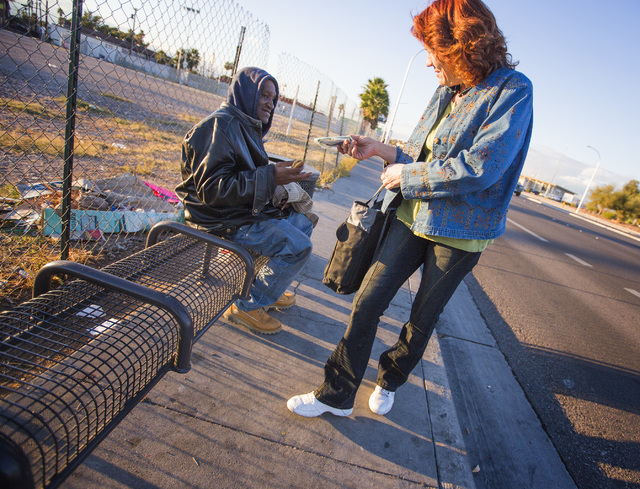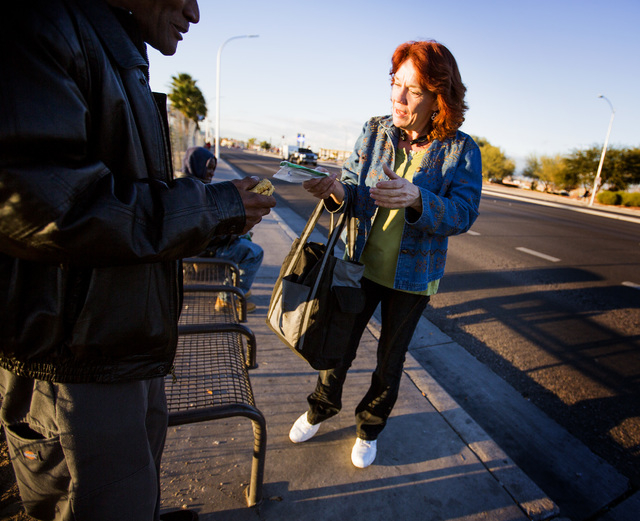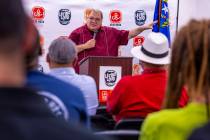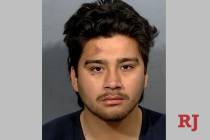Former prostitute fights sex trade with cookies
At a big-rig parking lot in the heart of the Las Vegas Valley, Kathleen Quirk is on a mission to change lives, starting with a bag of homemade chocolate chip cookies.
She carries the treats in a blue backpack. But the the weight of her load is heavier than it might seem her petite frame can carry.
Quirk, 49, has picked this time and place — dusk on a Friday in March at a truck stop on Tropicana Avenue, just west of Interstate 15 — because she has worked here, too.
Women are the merchandise, and men are ready to buy.
She was a street walker herself for 20 years, Quirk says, until a Las Vegas police officer granted her the will to change. “The gift of desperation,” she calls it.
Two decades working the streets gave her unmatched insight into the secluded world of hookers and pimps, she says. And in 2011, she began her own outreach: She’s a one-woman band preaching the gospel of redemption from illegal prostitution.
At least twice a month, she spends her own time and money to bake cookies in her apartment kitchen and deliver them fresh to the down and out.
“Everybody likes cookies,” Quirk says with a laugh, her auburn hair blowing in the wind.
They’re a soft currency for a hard topic. They buy time.
“They’ll talk to me if I give them a cookie,” she says.
And she talks to them, too.
By her count, she’s saved nine people from the same life she used to live.
“Nine people got their lives back from this,” Quirk says, wiping tears from her cheeks. “I think that’s amazing.”
Quirk broke from her sex-and-drug-filled job in 2010, she says, after an eye-opening conversation with a Las Vegas police officer who was arresting her for the fourth time in eight years.
The undercover cop, whom Quirk calls “Scott H.,” was taking her in on suspicion of soliciation.
But he talked about more than the law.
“Look what you’re doing with your life,” she remembers him saying. “You have nothing to show for yourself.”
She spent six months in Clark County Detention Center that time. The last time.
The words from Scott H. still stung. She thought about her life.
“All of my things fit in a paper bag.”
Her bag of cookies is bigger.
a subculture of violence
Scott H. might sound like Quirk’s angel, but he’s not the only messenger with words of wisdom, said retired Metro vice detective Sgt. Donald Hoier.
“We helped the girls all the time,” he said.
Some prostitutes first “turned out” as young as 11, Hoier said. They ask for help when they “decide they’ve had enough.”
In the first seven years of his vice career, Hoier said, he arrested one woman for prostitution “hundreds of times.”
One night, while walking through the Luxor parking garage to meet other detectives working inside, he said she approached him and said she needed help.
“I was the one she trusted the most,” he recalled her saying.
Hoier helped the woman, he said. And her pimp, whom she previously denied being connected to, was arrested. She is now an emergency medical technician back east, he said.
The memory “will stick in my mind forever,” Hoier said.
Over his 14 years with the department, Hoier said, he and other officers paid for bus tickets, airfare and luggage fees for women who said they were going home. In one instance, Hoier remembered seeing the women and girls he had helped escape back in town just a week later.
Before he got into vice, Hoier said, he believed no one really got hurt in the sex trade. But it didn’t take long to believe that prostitution is not a victimless crime.
“All of my preconceived notions about prostitutes were wrong,” he said. “I really think that 90 to 95 percent have a pimp and aren’t doing it voluntarily.”
It’s virtually impossible to measure prostitutes in any regard.
“Reliable statistics regarding prostitution are hard to come by since it’s incredibly difficult to reliably measure illicit and illegal activities because people work hard to stay off the radar,” wrote Lynn Comella, associate professor of gender and sexuality studies at UNLV.
One thing is for sure, Hoier said: “It’s a very violent subculture.”
Quirk recounted the violence that goes on, saying that beatings from a pimp and “Johns,” men paying her for sex, have put her in the hospital three times.
While working one night off north Las Vegas Boulevard, Quirk said, a man — who wasn’t her pimp — told her it would cost $5 to walk on “his sidewalk.”
“I told him right where to go,” she said, “and he punched me right in the face.”
many uninterested in message
Quirk said she recalls being arrested 33 times over the course of her career.
Since 2004, she has faced charges including prostitution, possession of heroin and cocaine and petit larceny, according to Clark County criminal records.
“I burned it all the way to the ground,” Quirk said several times, describing her life before sobriety.
With the help of Alcoholics Anonymous and a steady faith in God, Quirk said, she got sober Dec. 28, 2010, and is now the kitchen manager at the Las Vegas Rescue Mission.
But she never forgot about the women she left behind.
Quirk took her ministry to Las Vegas Boulevard near the Stratosphere on March 12. Within two minutes of walking the Boulevard, she stopped to speak with a homeless woman she recognized, Shannon Stavros.
“I used to be like you; I’m still just like you,” Quirk whispered in Stavros’ ear. For 4½ years, Quirk said she lived on the streets.
The hug-and-kiss-filled exchange was brief. Stavros wasn’t interested in an offer to be an “overnighter” at a shelter because she would have to pass an alcohol Breathalyzer test, Quirk said.
Before leaving, Quirk handed Stavros a few wadded-up dollar bills and cookies. “I don’t care what they do with the money,” she said.
Quirk is unfazed by the notion that some aren’t willing to accept help. She was back at it again the very next night.
After stuffing a fresh batch of cookies in her backpack, Quirk walked west on Tropicana, from the Wild Wild West hotel to The Orleans, stopping to talk to the women she identified as prostitutes.
The women weren’t interested in what Quirk was selling. The idea that they, too, could get sober and off the streets went unheard, the cookies uneaten.
At this point, Quirk reveals more of her story: She had just completed the last round of cancer radiation treatment earlier that day. She said it quietly and didn’t want to talk about it.
But this is how she wanted to celebrate.
Throughout the two-day mission, Quirk handed out cookies, cigarettes and money to those willing to lend an ear.
In the past, Quirk said she even has allowed women to stay in her home when they had nowhere else to go. “They’d steal everything from me,” she said.
But, she’d do it again.
“Half the hookers in this town have my number,” Quirk said. “I can’t not do it. Somebody did it for me.”
It makes her think about seeing the police officer who helped her a few years after she quit the sex trade.
While working at an Omelet House one morning in 2012, Quirk said she noticed him eating breakfast.
She got to thank Scott H. for changing the trajectory of her life.
Contact Kimberly De La Cruz at Kdelacruz@reviewjournal.com or 702-383-0381. Find her on Twitter: @KimberlyinLV.










































